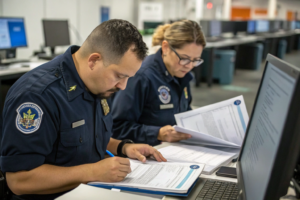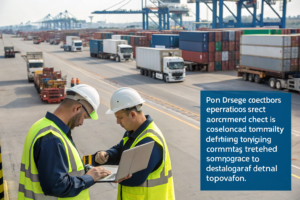International trade runs on documentation. Without the correct papers, even the best logistics plan can fail. Importers and exporters face strict requirements for bills of lading, commercial invoices, packing lists, and customs declarations. Missing or inaccurate documents often lead to costly delays and penalties.
Freight forwarders help with international trade documentation by preparing, verifying, and submitting paperwork accurately, ensuring compliance with customs regulations worldwide.
From my experience shipping goods across Asia, North America, and Europe, I know that working with expert forwarders saves businesses from the headaches of handling documentation alone.
Preparing Essential Trade Documents
The first step in international shipping is preparing the right documents. Each shipment requires multiple forms to satisfy customs authorities.
Freight forwarders create and organize all key documents needed for smooth cross-border trade.

What documents are most critical for shipments?
Key documents include the bill of lading, commercial invoice, packing list, and certificate of origin. Customs agencies like U.S. Customs and Border Protection require these for clearance.
How do forwarders prepare documents effectively?
Forwarders use standardized templates, verify product details, and ensure that all forms comply with destination country requirements. They also work with chambers of commerce to authenticate certificates of origin.
Verifying Accuracy and Compliance
Even small errors in paperwork can cause big problems. Incorrect HS codes, missing signatures, or wrong consignee details often trigger inspections.
Freight forwarders verify every document for accuracy and compliance before submission to avoid costly delays.

Why is document accuracy so important?
The World Customs Organization highlights that most customs delays are caused by incomplete or inaccurate documentation. Mistakes increase clearance times and create extra costs.
How do forwarders ensure compliance?
Forwarders rely on resources like the U.S. Harmonized Tariff Schedule and consult customs brokers to make sure product classifications and valuations are correct. This minimizes the risk of disputes.
Submitting Documents to Customs and Authorities
Once documents are prepared and verified, they must be submitted to customs agencies for approval.
Freight forwarders handle electronic submissions to customs portals, ensuring that shipments are cleared without delays.

How do forwarders handle electronic submissions?
They use systems like the Automated Commercial Environment (ACE) in the U.S. or the EU’s customs portals to file documentation electronically. This speeds up clearance and reduces paperwork errors.
Why is digital submission beneficial?
Digital platforms reduce human error, provide instant updates, and streamline communication with customs. According to FIATA, digital documentation is now a best practice in freight forwarding.
Handling Special Permits and Certifications
Some shipments require special permits or certifications depending on the product type.
Freight forwarders help secure the right licenses, health certificates, or safety documents needed for regulated goods.

What goods require special documentation?
Items like pharmaceuticals, food, and electronics often need certifications. Agencies like the U.S. Food and Drug Administration regulate many imported goods, requiring prior approvals.
How do forwarders manage special permits?
They coordinate with suppliers and government agencies to collect permits in advance. Following guidelines from the International Chamber of Commerce (ICC), they ensure shipments meet all regulatory requirements.
Conclusion
International trade documentation is complex, but freight forwarders make it manageable. By preparing essential documents, verifying accuracy, handling customs submissions, and securing special permits, they ensure shipments clear smoothly. For importers and exporters, working with a skilled freight forwarder means avoiding delays, reducing risks, and keeping supply chains running efficiently.









